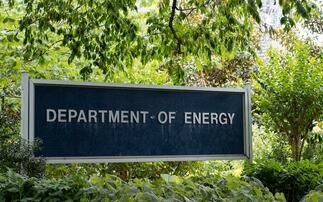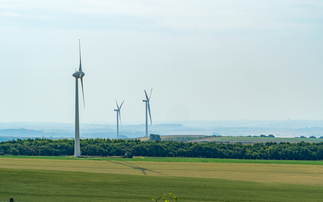Credit: iStock
Trade bodies sign new Memorandum of Understanding to help secure sustainable future for Ukrainian and UK energy markets following the war
Trade body RenewableUK has announced a new Memorandum of Understanding (MoU) with the Ukrainian Wind Energy Association on the sidelines of the international Ukraine Recovery Conference in London yesterday.
The agreement sets out a series of objectives designed to enhance collaboration between the two country's clean energy industries, bolster economic growth, and advance shared commitments to decarbonise the energy sectors of both Ukraine and the UK.
The text recognises the central role of renewable energy in combating climate change and achieving a sustainable energy future, while pledging to enhance cooperation and knowledge exchange between the two countries, while boosting trade in enewable energy technologies and services.
In a joint letter addressed to businesses participating in the conference, UK Foreign Secretary James Cleverly and the Ukrainian Minister of Foreign Affairs Dmytro Kuleba stated that it is "more important than ever" for the global business community to come together and support Ukraine's recovery effort.
Cleverly and Kuleba warned the magnitude of recovery efforts following the war were likely to be "unprecedented", and as such called for careful planning and coordination from the public and private sectors to maximise the economic potential resulting from the large-scale reconstruction that will follow the war.
"Showing solidarity with the people of Ukraine is vitally important right now," said Vicky Mant, RenewableUK's commercial director, who signed the MoU. "This agreement to work closely with the Ukrainian Wind Energy Association is a tangible example of how we can demonstrate our support in a practical way, putting in place a framework to help to boost the future prosperity of the country."
She added that RenewableUK would be working closely with its counterparts in Ukraine by exchanging information on the latest developments in clean technology, renewable energy policy development, and best practices, which should help accelerate project development in both countries and attract international investors.
She also hailed the "extraordinary achievement" that recently saw Ukraine bring online a new wind farm, even as the war continues. it continues to build onshore wind farms despite finding itself in a period of "intense conflict". The country recently cut the ribbon on a 19-turbine project just 60 miles from the front line which was officially opened last month and is already helping to combat the power cuts that have resulted from Russia's attacks on Ukraine's energy networks.
"That level of tenacity speaks volumes about the level of commitment in Ukraine to ramp up its renewable energy capacity and we stand ready to help them to deliver even more," Mant added.
Oleksandr Podprugin, vice chairman of Ukrainian Wind Energy Association, said that through the partnership the group was "taking a bold stride towards harnessing the potential of renewable energy".
"The MoU sets the foundation for a fruitful collaboration focused on economic growth, knowledge exchange and energy market development in both countries," he added.
"This collaboration is especially important for Ukraine as a sign of continuous support against Russian aggression. The challenges which our country faces, and our ambitious sustainable targets, require tremendous efforts from Ukraine and a real technological and industrial co-operation with our true partners."
The news came as research released earlier this week by UNECE calculated that renewables could meet up to 80 per cent of Ukraine's power demand by 2050.
The report argued that the country has "untapped potential" to develop significant bio-energy, hydro, solar, and wind generation capacity that could provide the building blocks for a low carbon energy system.
"This report aims at serving as a roadmap for policymakers and stakeholders, providing insights and recommendations for Ukraine's energy transition," said UNECE executive secretary Olga Algayerova.
"UNECE will continue to collaborate with the Ukrainian government, international organisations, and partners towards reconstruction and recovery for a just and sustainable future for Ukraine, in line with global climate commitments."
Ukraine currently depends heavily on fossil fuels, which accounted for around 70 per cent of the country's energy supply in 2020, according to UNECE.
The Russian invasion resulted in the occupation of the Zaporizhzhya nuclear power plant and about 44 per cent of Ukraine's total thermal power capacities, resulting in the destruction of critical energy infrastructure and a sharp decline in total energy supplies.
However, provided key strategies and investments are put in place, and complemented by nuclear power, UNCESE stressed that renewables could play a critical role in accelerating Ukraine's post-war recovery and delivering on its climate goals.
Keep up to date with all the latest green business news by signing up to the free Daily and Weekly BusinessGreen Newsletters.







